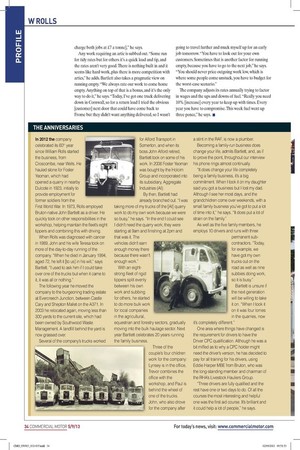In 2012 the company celebrated its 60" year since William
Page 26

If you've noticed an error in this article please click here to report it so we can fix it.
Rolls started the business, from Croscombe, near Wells. He hauled stone for Foster Yeoman, which had opened a quarry in nearby Dulcote in 1923, initially to provide employment for former soldiers from the
First World War. In 1973, Rolls employed Bruton-native John Bartlett as a driver. He quickly took on other responsibilities in the workshop, helping maintain the fleet's eight tippers and combining this with driving.
When Rolls was diagnosed with cancer in 1989, John and his wife Teresa took on more of the day-to-day running of the company. "When he died in January 1994, aged 72, he left it [to us] in his will," says Bartlett. "I used to ask him if I could take over one of the trucks but when it came to it, it was all or nothing."
The following year he moved the company to the burgeoning trading estate at Evercreech Junction, between Castle Cary and Shepton Mallet on the A371. In 2003 he relocated again, moving less than 300 yards to the current site, which had been owned by Southwood Waste Management. A landfill behind the yard is now grassed over. Several of the company's trucks worked
for Alford Transport in Somerton, and when its boss John Alford retired, Bartlett took on some of his work. In 2006 Foster Yeoman was bought by the Holcim Group and incorporated into its subsidiary, Aggregate Industries (Al). By then, Bartlett had already branched out. "I was taking more of my trucks off the [Al] quarry work to do my own work because we were so busy," he says. "In the end I could see I didn't need the quarry work; they were starting at 9am and finishing at 2pm and that was it. The
vehicles didn't earn enough money there because there wasn't enough work." With an eightstrong fleet of rigid tippers split evenly between his own work and subbing for others, he started to do more bulk work for local companies in the agricultural,
equestrian and forestry sectors, gradually moving into the bulk haulage sector. Next year Bartlett celebrates 20 years running the family business. Three of the couple's four children work for the company: Lynsey is in the office, Trevor combines the office with the workshop, and Paul is behind the wheel of one of the trucks. John, who also drove for the company after
a stint in the RAF, is now a plumber.
Becoming a family-run business does change your life, admits Bartlett, and, as if to prove the point, throughout our interview his phone rings almost continually.
"It does change your life completely being a family business, it's a big commitment. When I took it on my daughter said you got a business but I lost my dad. Although I see her most days, and the grandchildren come over weekends, with a small family business you've got to put a lot of time into it," he says. "It does put a lot of strain on the family." As well as the five family members, he employs 10 drivers and runs with three
permanent subcontractors. "Today, for example, we have got my own trucks out on the road as well as nine subbies doing work, so it is busy." Bartlett is unsure if the next generation will be willing to take it on. "When I took it on it was four lorries in the quarries, now
it's completely different."
One area where things have changed is the requirement for drivers to have the Driver CPC qualification. Although he was a bit miffed as to why a CPC holder might need the driver's version, he has decided to pay for all training for his drivers, using Eddie Harper MBE from Bruton, who was the long-standing member and chairman of the RHA's Livestock Hauliers Group.
"Three drivers are fully qualified and the rest have one or two days to do. Of all the courses the most interesting and helpful one was the first aid course. It's brilliant and it could help a lot of people," he says.









































